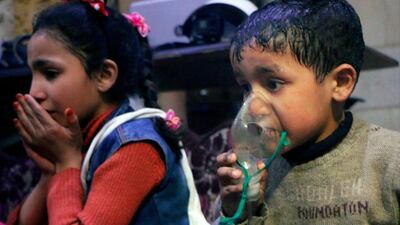Chemical attacks against civilians in Syria are followed not by relief or any meaningful justice for the victims but a torrent of conspiracy theories and outright propaganda designed to exculpate the perpetrators. After the chlorine gas attack on Douma on April 7 that killed at least 70 people, Russia, the most powerful foreign backer of Syrian dictator Bashar Al Assad, immediately floated the risible claim that Britain was behind the attacks. There is indeed a conspiracy afoot, but the offenders, if anyone cares to look closely, are Moscow and Damascus, not the defenceless men, women and children who are being bombed from the skies and gassed in the streets.
Why would Russia and Syria, if they are innocent as they claim, block investigators from the Organisation for Prohibition of Chemical Weapons from accessing Douma for two weeks? If they were innocent, they would have cleared OPCW's path; instead, arms inspectors have been holed up in the Four Seasons Hotel in Damascus as evidence is scrubbed at the scene of the crime. OPCW scientists had to abort their mission on April 17 when their convoy came under fire as it entered Douma – a town so wholly in the regime's grip that nothing occurs there without its knowledge or approval. The attack on OPCW coincided with reports of intimidation of local medics and civilians by the regime's thugs to remain silent. Experts are worried that much of the physical evidence will have perished by now: chlorine, a highly volatile compound, evaporates rapidly. Testimonial evidence implicating the regime will be virtually impossible to obtain in a place where its agents dispense death without a thought. Then there is the problem of physical evidence. Chemical weapons are clean killers: all they leave behind is corpses. As former weapons inspector Jerry Smith, who worked in Syria between 2013 and 2014 as part of OPCW, told The National: "The time between the actual incident and investigators getting there might result in the evidence slipping away."
All of these unique "benefits" of chemical weapons explain why Mr Al Assad has made such abundant use of them. The director of OPCW has requested Russia to adhere to international mechanisms and allow its fact finding to end. Moscow has chosen to ignore him – just as it just chose to overlook the fact that its client in Damascus, having called for independent investigations, effectively imprisoned OPCW scientists for weeks – and has instead decided to double down on its claim that the attack was a "hoax". Russia's absurd theatrics at the OPCW's headquarters in The Hague should not dilute the resolve of the world to bring justice to the victims of the unconscionable crime that was committed in Douma. Its perpetrators should not be allowed to get away.

